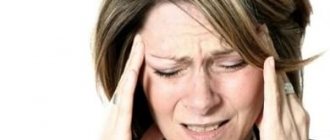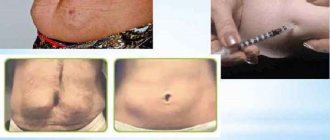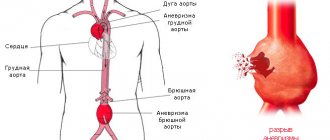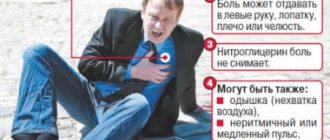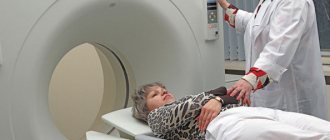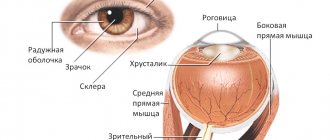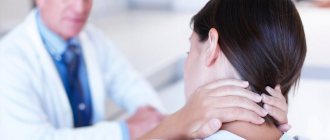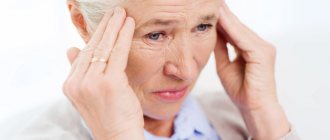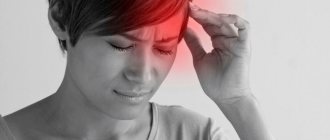What is muscle spasm, its types and causes
Muscle spasms are involuntary contractions of muscle tissue.
Unlike natural contractions (for example, during the digestion of food, during exercise, swallowing water), spasms occur without any external or internal cause, in the absence of a person’s desire, and unpredictably. As a rule, muscle spasms in the head area affect the temples, forehead, and back of the head. Involuntary contractions of the masticatory muscles can occur due to the use of stimulants (caffeine, taurine, narcotics) or for internal physiological reasons. In the second case we are talking about:
- trismus - a spasm that provokes a tight clenching of the jaws;
- bruxism - involuntary muscle contractions that occur mainly during sleep, at night, and are accompanied by grinding of the upper and lower rows of teeth.
Muscle spasms in the cervical spine can be either unilateral or bilateral. They are often associated with pinched nerves or spinal pathologies (for example, a hernia).
Advantages
Smart medicine for smart people
Safe, effective and natural rejuvenation
The best technologies for communicating with patients
We don't just take care of your beauty - we recharge you!
Types of head muscle spasms:
- episodic involuntary muscle contractions: headache, neck muscle pain lasts no more than 14 days over a period of 1 month;
- chronic spasms: 15 days a month or more.
Typically, the causes of spasms in the muscles of the head, jaws, and neck are:
- metabolic disease;
- lack of physical activity;
- diseases of the musculoskeletal system;
- vascular pathologies;
- deficiency of vitamins, microelements;
- stress: physiological, psychological, emotional stress;
- hypothermia;
- increased body temperature;
- obesity;
- genetic predisposition;
- injuries;
- pinching of nerve fibers.
Prevention
A well-developed muscular frame of the neck minimizes the likelihood of various injuries, so the basis of prevention is physical exercise and an active lifestyle.
If work requires constant being in one position, it is necessary to take fifteen-minute breaks for gymnastics every 1-1.5 hours.
Neck pain can be caused by an uncomfortable position while sleeping, so it is advisable to purchase an orthopedic pillow and spend ten minutes doing exercises in the morning.
A lack of important elements in the diet (calcium, magnesium, B vitamins) contributes to weakening and degeneration of muscle and bone tissue, which leads to osteochondrosis, so it is important to eat properly.
The most common cause of neck muscle spasms is overexertion, which occurs due to the fact that a person is in an uncomfortable position for a long time, experiences physical discomfort, but does not pay attention to it. Therefore, the most important thing in preventing any disease is to be attentive to your body and not ignore its signals.
Signs of involuntary muscle contraction are:
- with bruxism – grinding of teeth during sleep, a feeling of overexertion in the jaws after waking up;
- with spasms of the head muscles - hoop-shaped pain in the temples, in the forehead, in the back of the head;
- pressing, pulsating, squeezing nature of pain;
- feeling of heaviness in the area of spasm;
- pain when pressing trigger points (try to palpate the area of the head when it hurts: when you press certain points, the pain increases significantly);
- nausea, vomiting, dizziness;
- painful reaction to light, loud sounds (infrequently).
When to see a doctor:
- headaches appeared suddenly and do not go away;
- you are experiencing muscle pain for the first time after 50 years;
- pain is accompanied by dizziness, weakness, numbness of the limbs;
- pain lasts more than two weeks in a row;
- painkillers either do not work at all or give an insignificant short-term effect;
- the pain is localized on one side of the head/neck.
Muscle spasms that provoke pain indicate a disruption in the healthy functioning of the body. To prevent the development of the disease, it is important to consult a doctor in time. We advise you to visit a therapist, neurologist, endocrinologist, who will prescribe detailed laboratory diagnostics for you. Based on the research results, specialists of another profile may be involved in your treatment: an orthopedist, a cardiologist, a chiropractor. Complex treatment may include taking medications, a massage course, and therapeutic exercises. A good doctor will definitely give you recommendations on nutrition and daily routine.
MIGUNOVA ANASTASIA ANDREEVNA
Cosmetologist
Initial consultation: RUB 4,500
Make an appointment with a doctor Instagram
VYATKINA IRINA SERGEEVNA
Gynecologist-endocrinologist
Initial consultation: RUB 8,500
Make an appointment with a doctor Instagram
KALININA EKATERINA ALEXANDROVNA
Cosmetologist
Initial consultation: RUB 4,500
Make an appointment with a doctor Instagram
KOZLOVA EKATERINA NIKOLAEVNA
Gynecologist-endocrinologist, oncologist
Initial consultation: RUB 5,000
Make an appointment with a doctor Instagram
Why does pain occur?
People who lead a sedentary lifestyle and have a weak muscular frame are predisposed to this kind of disease.
The cause may be either disproportionate physical stress on the neck (lifting significant weights, carrying them on the shoulders), or prolonged stay in one position with an elongated and tense neck, as well as hypothermia, prolonged exposure to a draft. Various injuries to the ligamentous apparatus of the neck, as a rule, make themselves felt immediately with acute pain, but sometimes symptoms appear several hours after the injury. In people susceptible to anxiety disorders, a spasm of the neck muscles is possible due to nervousness; treatment should include not only medications, therapeutic exercises and physical therapy, but also taking sedatives and consulting a psychologist. A person who is in a constant state of anxiety and stress is tense, unconsciously holding his whole body in tension, including his neck, as if trying to protect himself from an external threat, and cannot allow himself free movements.
What can you do at home if:
Head muscle spasms
To relieve spasm and pain, you can take aspirin, a painkiller tablet like Ibuprofen, or a painkiller in powder form (for example, Nimesil). Give yourself peace of mind. You can try pressing trigger points and stretching your earlobes.
Jaw muscle spasm
If trismus manifests itself, before the doctor arrives, you can self-massage the masticatory muscles, accelerating the blood in them, alternately pressing on the muscles constrained by spasm. It is also possible to use compresses (alternate warm and cold compresses, apply them to the lower third of the face).
Cervical muscle spasms
Make gentle rotational movements with your head, lower and lift it (without throwing it back too much), turn it right and left. You can try stretching your neck muscles with your hands. Warm compresses and rubbing are effective.
*Attention! The information is for informational purposes only and does not constitute medical advice.
Reviews
Tatiana
I am happy to be among your guests at the clinic, I enjoy our communication, I am grateful for your super professionalism, for giving beauty and a sense of confidence in your professional actions, protection from “age-related changes”

